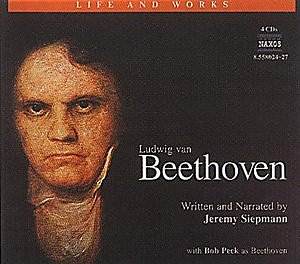 |
Ludwig van BEETHOVEN Life and Works, written and narrated by Jeremy Siepmann, with Bob Peck as Beethoven. Recorded at Bucks Audio Recording, U.K., and Hats Off Studios, Oxfordshire, U.K. Issued 2001. Crotchet £24.99 AmazonUK £21.99 AmazonUS Amazon recommendations |
Did you know that within the five-year period from 1773 to 1778, the first cast-iron bridge was built in England, the waltz began in Vienna, Goethe wrote "Young Werther," the American Revolution broke out, the water - turbine was invented, the Declaration of Independence was signed, Mozart wrote his first great Piano concerto, Cook discovered Hawaii, the torpedo was invented, the births of Turner, Jane Austen, Constable and Hoffmann took place - oh, and Beethoven had his first music lessons.
One of the best things about this unusual issue is the chronological listings of world events during Beethoven's life, and it certainly makes up for some of the rather lacklustre commentary in the rest of the booklet. It's the sort of idea which has purists searching for cutting epithets, and I have to admit that my initial reaction was to scoff. It is, after all, easy to seek expert recommendations and acquire one's own selection of Beethoven's central works. However, once I had listened to some of it and appreciated what the narrator was trying to do, I could see the point of the endeavour. There are some works by Beethoven which everyone knows, yet they are not always known, as it were, in context - and this collection does an admirable job of helping the listener to do just that. We are reminded, not only of his tremendous courage and strength of character, but also of the circumstances surrounding the composition of his greatest works.
Appropriately, the F minor Sonata Op. 57 (Appassionata) is introduced by a long piece in which one of Beethoven's pupils, Ferdinand Ries, talks about the composer's encroaching deafness, and the performance, by Jenő Jandó, is acceptable if not exactly in the Wilhelm Kempff league - but then, if you have Kempff, you are unlikely to be a possible purchaser for this recording. Similarly, the version given here of the Funeral March from the "Eroica," not credited to any orchestra in the listing, (although one assumes it's the Nicolaus Esterházy Sinfonia, directed by Béla Drahos) will not impress anyone who regards Giulini's interpretation as the finest - whereas Giulini is magisterial without undue pomp, elegiac without excessive sentimentality, the direction and playing here are simply pleasingly workmanlike, and no more.
Siepmann's major interest seems to be in bringing out two strains of Beethoven's character - his incredible originality, allied to his unfortunate talent for choosing the wrong woman to love, or the wrong circumstances in which to love her; the composer's realization that, as Hardy put it, "The hour to love rarely coincides with the One for loving" must have been a searing one, and this is shown in many well chosen passages from his most famous love letters, nicely juxtaposed with extracts from such works as the first "Rasumovky" quartet - the Adagio is eloquently played by the Kodály, and added interest for the neophyte is provided by the corresponding quotation from the composer, addressed to Schuppanzigh after the latter had complained that one of his quartets was unplayable - "What do I care for your miserable fiddle when the spirit moves me!?"
Elsewhere, works are set in context with admirable clarity, particularly in the case of the Violin Concerto Op. 61, and selections are apt if not always what one might choose oneself - for example, "Fidelio" is represented by a not-very-impressive Prisoners' Chorus rather than, say, the Act 1 quartet. Performances of the "Archduke" trio and the 5th Symphony are rather featureless, with bland rhythms and at times suspect intonation, but there are corresponding strengths in the later selections; the disc ends with a lovely performance of the "Cavatina" from Op. 130 by the Kodály quartet, and a better-than-average "Ode to Joy" directed by Béla Drahos. The Kodály, in particular, play with rapt attention to phrasing, and their version would be an ideal introduction to the wondrous late quartets, which the narrator rightly says are the greatest ever written. My own preference is for the Busch Quartet, especially in Op. 130 and 131, but the present versions are very sound without being disturbing.
The part of Beethoven is taken with characteristic gusto by Bob Peck, in one of his last performances before his untimely death in 1999, and Jeremy Siepmann narrates with enthusiasm and, at times, moving grace. In all, then, not a set for the connoisseur, but an extremely useful introduction to Beethoven for those who know only his most famous works, and a fascinating historical survey of his era and position within it for those who are keen to know more about the man whom the narrator calls "the greatest composer who ever lived."
Melanie Askenazi
DETAILED CONTENTS
Music excerpts are taken from the following, all from Naxos
Piano Sonatas, Jenő Jandó
Overtures: Slovak Philharmonic Orchestra / Stephen Gunzenhauser
Piano Concertos 2, 5 , Stefan Vladar / Capella Istropolitana/Barry Wordsworth
Violin Concerto / Romances, Takako Nishizaki / Slovak Philharmonic Orchestra / Kenneth Jean
Violin Sonatas, Takako Nisizaki / Jenő Jandó
Dances, Capella Istropolitana / Oliver Dohnanyi
Piano Trios "Archduke" and "Ghost" Jenő Jandó / Takako Nishizaki / Csaba Onczay
Fidelio, German Operatic Choruses (various artists)
Piano Trios Op. 1. no. 3, Op.44, WoO38, Hess 48, Stuttgart Piano Trio
Chamber Music for Horns, Wind and Strings, various artists
Symphonies nos 1,2,4,5,6,7, Nicolaus Esterházy Sinfonia / Béla Drahos
Symphony no. 9 "Choral" Papian / Donose / Fink / Otelli, Nicolaus Esterházy Sinfonia and Chorus, Béla Drahos.
String Quartets, Kodály Quartet